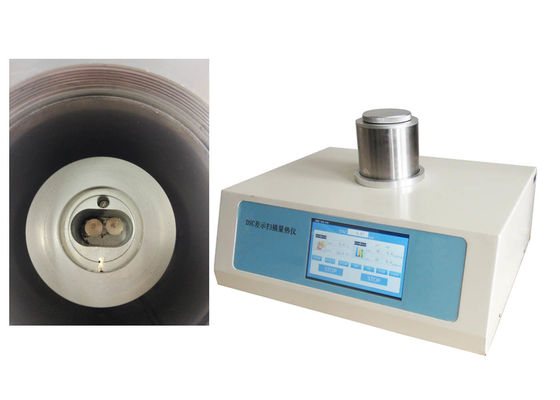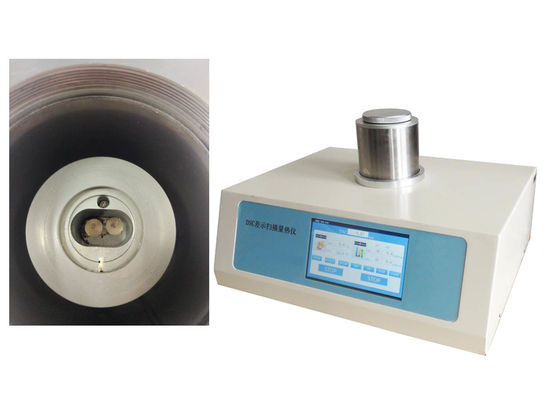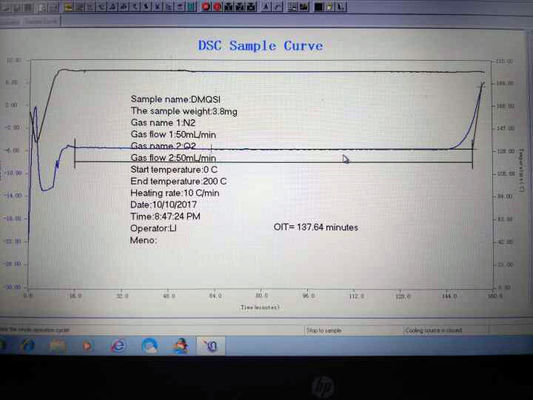Organic Inorganic Polymer Mineral Petrochemical Products Analysis with Differential Scanning Calorimetry Machine
The DSC-500 is an intelligent, miniaturized, and integrated thermal analysis instrument. It is applicable for analyzing key material behaviors including melting, solidification, decomposition, chemical combination, reduction, oxidation, and crystallization. Additionally, it supports phase diagram construction and catalyst R&D (research and development) -- providing critical data for material performance evaluation and formulation optimization.
Equipped with a user-friendly and efficient data processing system, the DSC-500 features scientific calculation methods for core thermal parameters. These parameters include epitaxial onset temperature, enthalpy change, glass transition temperature, enthalpy ratio, oxidation induction time (OIT), specific heat capacity, and kinetic parameters. Note that the DSC-500A variant is specifically designed for OIT testing.
This instrument serves as a reliable analytical tool for a wide range of materials across industries, such as organic compounds, inorganic materials, polymers, minerals, petrochemical products, textiles, and pharmaceuticals.
Equipped with graph processing functions such as magnification and zoom-out, it features an intuitive and user-friendly interface that ensures straightforward operation -- even for operators with basic thermal analysis experience.
Instrument Features
1. Display System
Equipped with an LCD liquid crystal display with blue backlight, it displays abundant information, including set temperature, sample temperature, oxygen flow rate, nitrogen flow rate, differential thermal signal, and the status of various switches--ensuring comprehensive real-time monitoring of test parameters.
2. Communication Interface
The USB communication interface features strong universality, stable and uninterrupted communication, and supports an automatic reconnection function--guaranteeing reliable data transmission during long-term testing.
3. Furnace Structure
- The furnace body adopts a compact structure with stepless adjustable heating rate, meeting diverse temperature-rise requirements for different tests.
- The entire installation process is optimized with a full mechanical fixing method, which completely eliminates the risk of colloid pollution inside the furnace affecting the differential thermal signal--ensuring the accuracy of test data.
4. Dual Temperature Probe Design
This design ensures high repeatability of sample temperature measurement.
- A temperature probe installed on the furnace wall is used for PID control of the overall furnace temperature. However, thermal inertia causes a certain deviation between the furnace wall temperature and the actual sample temperature, and the deviation varies with seasons.
- To solve this problem, an additional temperature probe is installed at the bottom of the sample to measure its real-time actual temperature. Combined with our proprietary temperature control technology, the furnace wall temperature is adjusted to make the sample temperature precisely reach the set value--greatly reducing errors in both differential thermal signals and temperature signals.
5. Gas Atmosphere Control
A digital gas mass flow meter enables automatic switching between two gas atmosphere flows. It features fast switching speed and short stabilization time--ensuring stable and reliable atmosphere conditions during the test.
6. Calibration & Cooling
- Standard samples are provided for convenient calibration of temperature coefficients by customers--simplifying routine verification operations.
- A dedicated furnace cooling interface is designed to facilitate rapid cooling of the furnace by customers, shortening the interval between consecutive tests.
7. Software Performance
- The software adapts to computer screens of various resolutions, automatically adjusting the curve display mode according to the screen size. It is compatible with both laptops and desktops, and supports operating systems such as Win2000, XP, VISTA, and WIN7.
- It supports user-programmable protocols to realize automated test procedures. The software provides dozens of instructions, allowing users to flexibly combine and save instructions according to their specific test steps--simplifying complex operations into one-key operations.
Technical Parameters
| Product Name |
Determination of glass transition temperature-DSC |
| Model |
DSC-500A |
| Temperature range |
Room temperature to 500 ℃ |
| Temperature resolution |
0.1 ℃ |
| Heating rate |
0.1 ~ 80 ℃ / min |
| DSC range |
0 ~ + 500 mw |
| DSC resolution |
0.01 mW |
| DSC sensitivity |
0.1 mW |
| Working power supply |
AC 220V 50Hz |
| PC interface |
USB |

 Your message must be between 20-3,000 characters!
Your message must be between 20-3,000 characters! Please check your E-mail!
Please check your E-mail!  Your message must be between 20-3,000 characters!
Your message must be between 20-3,000 characters! Please check your E-mail!
Please check your E-mail! 





